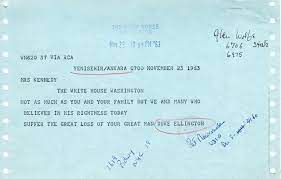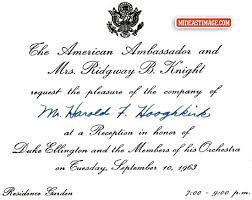A Magnificent Suite Inspired by a Tour Touched by Tragedy
It impressed me as a teen listening to Duke Ellington’s Great Paris Concert when he announced at the end of “Jam With Sam” that trumpeter Cat Anderson’s solo ended on a “high C, and that’s above Hyannisport.” As a jazz-loving Irish Catholic from the Bay State, I was equally enthralled by JFK and EKE, and to hear Edward Kennedy Ellington make such deft allusion to the Summer White House before a packed house in the French capitol that was itself in thrall to Jack and Jackie was one of the earliest synchronistic experiences of my life.
The Paris concerts were performed in February, 1963. Nine months later, Ellington was two-thirds of the way through a State Department-sponsored tour of the Mideast when word arrived in Ankara, Turkey, that the president had been assassinated in Dallas. Terry Teachout’s new biography Duke: A Life of Duke Ellington, reports that upon hearing the news, Ellington told Foreign Service officer Charles Sam Courtney, “It’s a hit, man. He was fingered…John F. Kennedy was the only president since Lincoln who gave a damn about Negroes.”

By then the band had played about 45 concerts in the Mideast and India. Ellington offered to continue the tour with a revised presentation. According to Harvey Cohen’s groundbreaking work, Duke Ellington’s America, Duke would have played a program similar to the memorial he’d presented for FDR in 1945. “A lot of sad, slow music. I’d have cut out the theatrical stuff and there wouldn’t have been any swinging. And I’d have eliminated the glib sense of humor from my annotations.”

But the proposed memorial to the slain president was declined by the State Department, which nonetheless extended the tours it was sponsoring by the Joffrey Ballet, Los Angeles Chamber Orchestra, and others. Duke said, “They thought jazz concerts might be considered in bad taste…I’m always fighting against the shady associations people have given it.”
Ellington and his collaborator Billy Strayhorn composed four of the pieces that were eventually grouped together as the Far East Suite within months of the tour’s end. They were premiered in London early in 1964 in a suite entitled “Impressions of the Far East.” Two years later the entire suite of nine pieces was recorded for RCA Victor. Its rousing opener, “Tourist Point of View,” was mentioned by Bob Dylan in Chronicles, Volume One, as “a good record to wake up to.”
The best-known work from the suite is “Isfahan,” which was composed by Billy Strayhorn under the title, “Elf.” It was completed several months before the tour began and was one of the many ballads composed by Strayhorn expressly for Johnny Hodges. Ellington used to introduce the Cambridge-born Hodges by saying, “If you’ve heard of the saxophone, ladies and gentlemen, then you’ve heard of Johnny Hodges.” That was just the kind of eloquence that JFK admired.
P.S. I’ve been struck by comments left on my Facebook page under the image of Ellington’s telegram to Jacqueline Kennedy. Here are two of them. Alan Pasqua, the jazz pianist based in Los Angeles, wrote, “Sounds like his music when you read it out aloud.” Christopher Lydon, host of Radio Open Source on WBUR and an advocate for the creation of public statues honoring Bostonians Johnny Hodges and Harry Carney, said. “So extraordinary — this is the way the saints speak to and about each other, giant to giant, genius to genius. Blessings on this melancholy day. Duke lives! JFK lives! Praise God for both of them.”